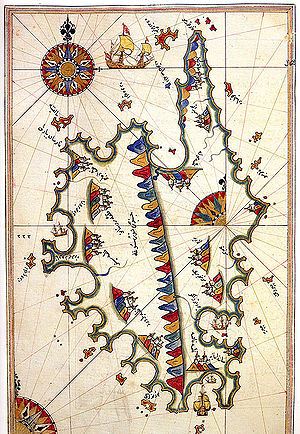Invasion of Corsica (1553)
| Invasion of Corsica | |||||||
|---|---|---|---|---|---|---|---|
| Part of the Ottoman-Habsburg wars | |||||||
 Historic map of Corsica by Piri Reis |
|||||||
|
|||||||
| Belligerents | |||||||
|
|
|
||||||
| Commanders and leaders | |||||||
|
|
|
||||||
| Strength | |||||||
|
|
|||||||
The Invasion of Corsica of 1553 occurred when French, Ottoman and Corsican exile forces combined to capture the island of Corsica from the Genoese.
The island had considerable strategic importance in the western Mediterranean, being at the heart of the Habsburg communication network and serving as a forced stopover for small boats sailing between Spain and Italy.
The island had been administered since 1453 by the Genoese Bank of Saint George. The invasion of Corsica was accomplished for the benefit of France.
The island had major strategic importance, as it was located on the sea route between Spain and Italy, which was vital for the Holy Roman Empire.
The French king Henry II had entered into a major war with the Habsburg Emperor Charles V in 1551, starting the Italian War of 1551–1559. Looking for allies, Henry II, following the Franco-Ottoman alliance policy of his father Francis I, sealed a treaty with Suleiman the Magnificent in order to cooperate against the Habsburgs in the Mediterranean.
The Ottomans, accompanied by the French ambassador Gabriel de Luetz d'Aramon, had already defeated a Genoese fleet under Andrea Doria in the Battle of Ponza the previous year in 1552. On 1 February 1553, a new Franco-Ottoman treaty of alliance, involving naval collaboration against the Habsburgs, had been signed between France and the Ottoman Empire.
...
Wikipedia
